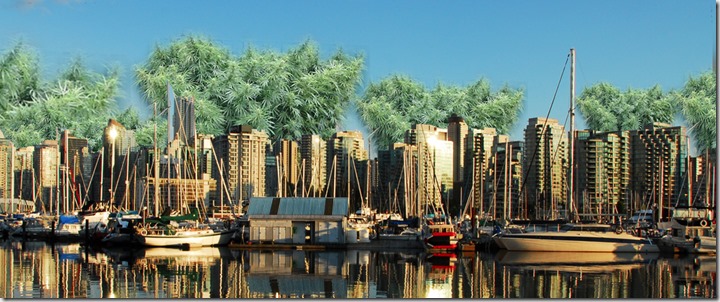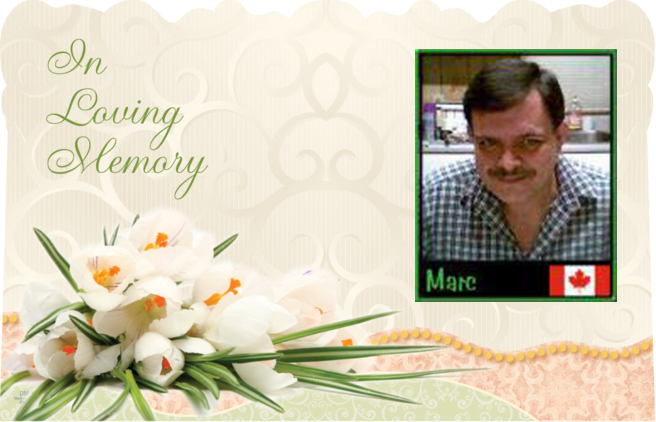Unprecedented Increase in Cannabis Dispensaries Causing Growing Pains
When is something illegal? It’s a simple question with multiple answers depending upon what that “something” represents in the question. In the case of medical marijuana, that simple question has become infinitely more complex in Canada than it used to be. It is clear that according to the federal Conservatives there is no grey area when it comes to marijuana, medical or otherwise.
In a recent Globe and Mail article Paul Calandra, parliamentary secretary to the Prime Minister, said the government has no plans to formally legalize marijuana or medical marijuana dispensaries. “They were illegal before, they remain illegal today, and as long as we’re in government they will continue to be illegal,” Mr. Calandra goes on to say. “That is the law of the land, and we would hope our municipal and provincial partners would enforce the law as it stands today.”
One of those municipal partners, Vancouver BC, has chosen to not enforce the law as it stands today. With an estimated 60 marijuana dispensaries currently operating in all parts of the city, the west coast mecca of all things progressive is actually exploring the idea of licensing, taxing and controlling the rapidly growing dispensary industry like pharmacies, rather than raiding and shutting them down as federal law dictates. In the case of Vancouver, you can see how my simple question has received a simple answer: something is no longer illegal when everyone participates in it as if it were legal.
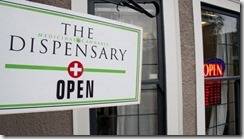 The exact number of medical marijuana dispensaries currently operating in Canada is difficult to tally, but the Canadian Association of Medical Cannabis Dispensaries has been tracking their growth: City of Vancouver: 60, The rest of B.C.: 35, Alberta: 2, Manitoba: 1, Ontario: 13, Quebec: 4, Nova Scotia: now 0 as a result of a raid last fall on the only maritime club, located in Halifax. The figures show that Vancouver leads the country. But other provinces are beginning to see the trend push into their jurisdictions, however unfriendly. Regardless of location, all of the nation’s dispensaries operate outside the MMPR, the federally regulated distribution system for medical marijuana currently in place in our country. The Conservative government overhauled the distribution system last year, switching production from home gardens to large-scale commercial operations. Patients in Canada have argued the new federal system doesn’t meet patients’ needs because legal marijuana is too expensive, supply is low, or commercial producers don’t offer an adequate variety of strains. In addition, the commercial system also doesn’t produce medible products, oils, or other derivatives like CBD products, but dispensaries do.
The exact number of medical marijuana dispensaries currently operating in Canada is difficult to tally, but the Canadian Association of Medical Cannabis Dispensaries has been tracking their growth: City of Vancouver: 60, The rest of B.C.: 35, Alberta: 2, Manitoba: 1, Ontario: 13, Quebec: 4, Nova Scotia: now 0 as a result of a raid last fall on the only maritime club, located in Halifax. The figures show that Vancouver leads the country. But other provinces are beginning to see the trend push into their jurisdictions, however unfriendly. Regardless of location, all of the nation’s dispensaries operate outside the MMPR, the federally regulated distribution system for medical marijuana currently in place in our country. The Conservative government overhauled the distribution system last year, switching production from home gardens to large-scale commercial operations. Patients in Canada have argued the new federal system doesn’t meet patients’ needs because legal marijuana is too expensive, supply is low, or commercial producers don’t offer an adequate variety of strains. In addition, the commercial system also doesn’t produce medible products, oils, or other derivatives like CBD products, but dispensaries do.
In the West Coast atmosphere of acceptance, neighbourhood dispensaries thrive, and Vancouverites can purchase marijuana from vending machines, or get their meds from products manufactured and sold through neighbourhood dispensaries. These offer pot-infused ketchup, olive oil and brownies, as well as the standard pre-rolled blunts and dozens of strains of apparently pure medical B.C bud. The city’s attitude of acceptance is so pervasive that other non-pot based businesses like restaurants have started to tap into the Vansterdam movement. Vancouver’s Mega Ill Pizzeria features on-table marijuana grinders and vaporizers, and offers a pot-infused pizza for those who can furnish a medical marijuana card, and “Bring Your Own Cannabis” meal options for those who can’t. Vapour lounges have sprung up all over the city as well, offering comfortable locations for patrons to meet with friends, medicate, and then enjoy beverages, food and conversation about the end of prohibition, perhaps.
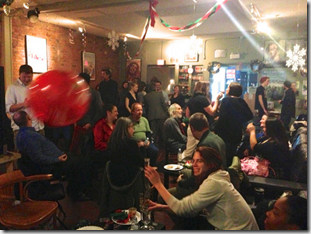
Unfortunately, with rapid expansion comes the opportunity for exploitation. Critics of the boom claim that the new players are not meeting old-school compassion club standards. Many new locations require nothing more than a signed form from a naturopath or a doctor of Traditional Chinese Medicine, and many offer convenient, in-house diagnosis with promises of a legal license in 24hrs. It seems that two dispensary models are at war to see which will prove to be the model eventually adopted by everyone. While all dispensaries follow some basic rules like asking for photo ID, and contracts requiring no sharing or resale, the traditional old school compassion clubs, some of which have operated for nearly 20 years, and a few conscientious newer compassion organizations, have banded together to form the Canadian Association of Medical Cannabis Dispensaries. The association’s members differentiate themselves by adopting a strict body of rules and regulations setting strict standards on everything from proof of condition to ensuring that supplies of medicine are not sourced from the black market, but from exclusively contracted growers.
However, many dispensaries are operating outside of the traditional not for profit model pioneered by clubs like the VCBC in Victoria, on Vancouver Island, and choose to follow a California style profit model which features storefront retail operations offering plush settings, exclusive strains, tight security and home deliveries. Jamie Shaw, president of CAMCD has been quoted in numerous newspaper articles stating that, “the CAMCD dispensaries are actually at a disadvantage to all these other dispensaries because there are some whose requirements are not nearly as strict. The medical marijuana industry has changed drastically in the time the compassion club has existed.” That change becomes clearer every day to Vancouver residents as more and more neighbourhood retail style dispensaries pop up.
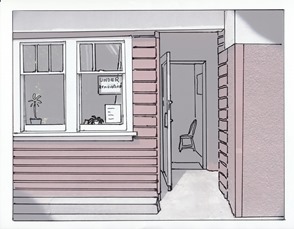
Critics also claim that, through lackadaisical rule enforcement and poor monitoring of access to membership, dispensaries with looser criteria for membership government actually threaten the eventual adoption of a successful not for profit compassion club model by the federal government. They are just helping to fuel conservative rants about patients abusing their right to access the medicine buy reselling and feeding the black market. For many of the new dispensaries a diagnosis from an onsite, or worse, online naturopath confirming they have any ailment ranging from cancer or ADHD to sleep disorders as proof of condition, is already a common practice, and smacks of a focus on profits rather than compassion. Dab hour, equivalent to the old happy hour, is a common service offered at many of the new clubs. There are also sign up bonuses, sales on medicine, special combo packages featuring weed and medibles, and other promotional offers to attract and keep the ever increasing number of consumers in the very competitive marketplace.
Social media are playing their part in the rapid expansion by promoting dispensaries and their exclusive strains and medibles. Sites like Leafly.com identify the latest strains and where they can be bought. They offer consumer reviews and tips, while constantly adding to the lists of marijuana outlets. Dispensary pages explode all over Facebook, and twitter abounds with a constant buzz from the blossoming dispensary culture. Yelp has even joined in the fun by allowing reviews of dispensaries which comment on varieties available, staff knowledge and courtesy, ease of membership requirements, as well as safety and overall atmosphere. The current boom has Vancouverites asking is marijuana legal now? This is a question that, in Vancouver at least, has become almost rhetorical, as the reality is an obvious ‘yes.’
Bob Marley once said, “ When you smoke the herb, it reveals you to yourself.” This may be a truth for many Vancouverites, and very soon many Canadians, as society accepts and embraces the wonders of legal access to the people plant. The end of prohibition is near despite the Harper government’s bold statements to the contrary. The marijuana dispensary boom in Vancouver is a mere shadow of what is to come on a national scale. With successful outcomes in the Supreme Court of Canada extracts trial of Smith VS Regina, and the Allard group challenge in BC Supreme Court, the Conservative government is outside on the ledge looking down, facing a fall that will lead to the end of an anti drug policy that makes up one of the pillars of the party.
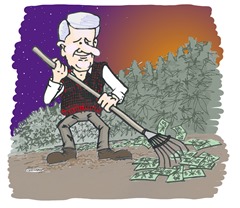
Mr. Harper will have much to deal with at election time, and much to explain to a right wing Christian conservative base that has little patience for failure and less for loss of profit. He faces the current disintegration of the energy sector and the Alberta economy with it, the Canadian public feeling invaded by a threatening and overreaching national security law in Bill C-51, and court orders from the SCC and BC Supreme Court essentially freeing marijuana extracts and the operation of home based patient gardens. Vancouver’s medical dispensary boom is the harbinger of a near future of fully legal marijuana in Canada. The fall of marijuana prohibition is happening all around us as state after state in the US legalizes. It could be argued that Vancouver’s green rush is due at least in part to legalization in the two border-states of Alaska and Washington, and certainly falls in step with the whole of western North America when you include California and the state of Oregon.
The fall of marijuana prohibition is a wave that seems to be sweeping eastward across the continent, carrying with it a change in attitude from the North American public, which will force legalization and eventually allow the removal of the “medical” guise used by many of Vancouver’s new dispensaries. Legalization in Canada means these new for profit dispensaries can shed their compassionate pretences and simply be themselves as boutique retail pot shops. Through taxation, employment, and the following of rules set out by the city, the road to legalization opens for all of these marijuana outlets, medical or recreational; in Vancouver there are currently 60 reasons why the idea of legal easily accessible weed is working everyday.
–Dean Schwind is a two time cancer survivor, long time commercial and medical marijuana grower, teacher, writer, musician, radio host, and activist. A proud former staff member of the Cannabis Buyers Club of Canada, he has fought on the front lines for the end of prohibition through his alter ego Sticky Kola and the infamous BC band King Bong. Raising money, changing perceptions, and generally freaking the public in an effort to help sick people gain access to the benefits of medical marijuana.

